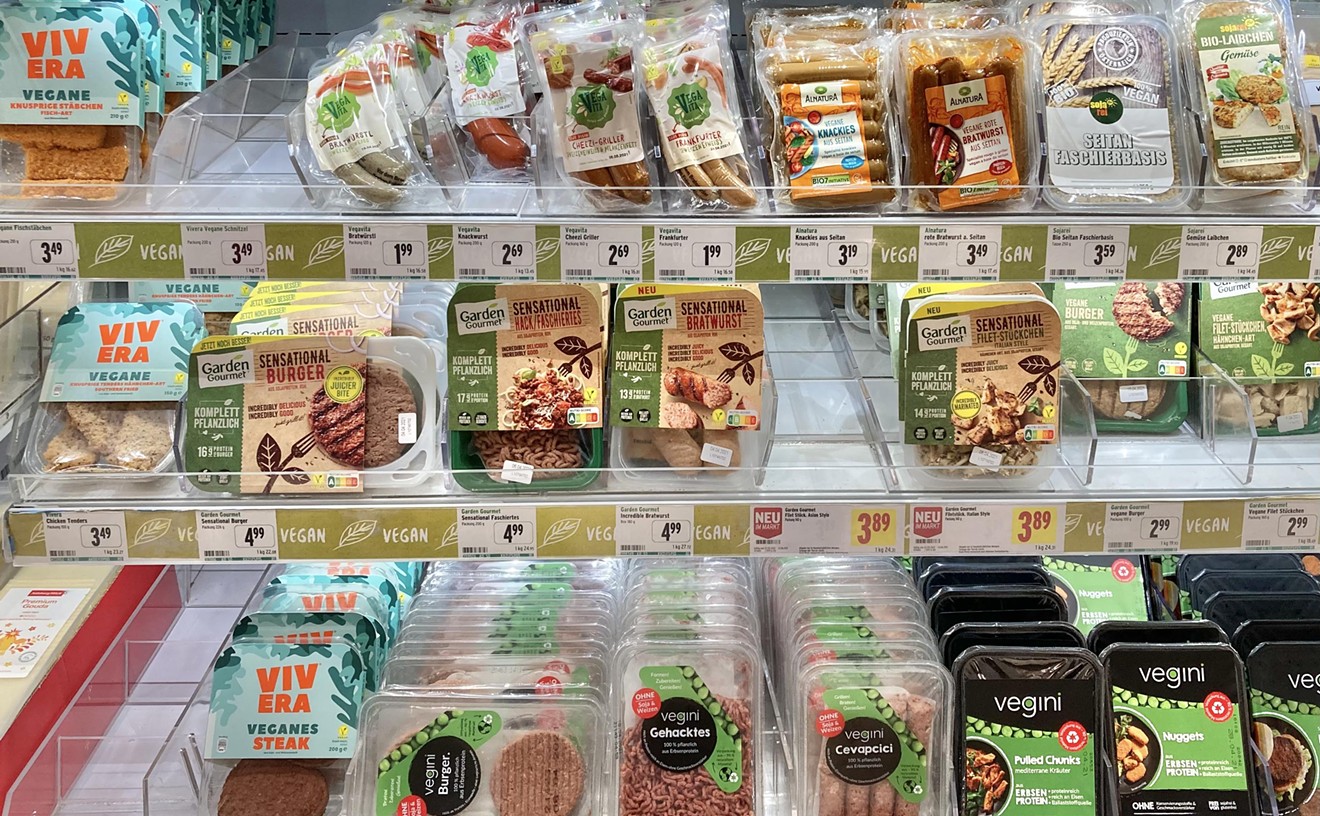In a city where you can count the number of Ethiopian restaurants on one hand, finding a good place to gather around a platter of injera bread dappled with heaps of fiery wot is no small feat. Since the 1990s, Café Lalibela in Tempe has been the Valley mainstay for Ethiopian cuisine, a popular spot where you might see college students filling up on spicy lentil dishes like misir wot and free rolls of injera, while at the next table over, a romantic date is winding down over small cups of strong Ethiopian coffee.
A handful of other Ethiopian mom-and-pop places have turned up over the years, but most have regrettably faded into the dark recesses of metro Phoenix food history. Let's hope the fates are kinder to Abyssinia Restaurant & Cafe, a small Ethiopian restaurant that opened last summer in an aging midtown strip mall, taking the space formerly occupied by Sacred Hogan Navajo Frybread.
The Abyssinia dining room is small, studiously neat, and dimly lit, with a bright orange accent wall adorned with portraits of Ethiopian royalty and sunny travel posters of smiling young women in traditional Ethiopian dress. Colorful, straw-basket mesob tables are perched around the perimeter of the room, and there's a coffee ceremony setup tucked into the corner that appears to be mostly ornamental.
If you're accustomed to eating at Ethiopian restaurants, you'll be familiar with many items on the Abyssinia menu, or at least you already understand that injera is the central fact of Ethiopian cuisine. The spongy, floppy bread, made of teff grass and barley, resembles a giant, half-baked crepe, and you use it in place of a spoon to scoop bits of veggies and meats off the tray and into your mouth. The bread, served flat against a round communal tray, makes a lovely edible canvas for furnishing colorful mounds of food, from brick-red wots (the traditional Ethiopian curries or stews that have launched a million food puns) to sizzling heaps of tibs (sautéed meats). The injera at Abyssinia is less sour than the bread you may have had elsewhere, but still tart enough to mellow out the bright, spicy flavors in many of the dishes.
The Abyssinia menu is divided between vegetarian and meat dishes, and you can mix and match from both sides of the menu to compose a platter suitable to your liking. For newcomers to Ethiopian cuisine, a server may recommend the bayenetu, a collection of meat-free dishes listed simply on the menu as the veggie sampler plate. It comes with an assortment of veggies and legumes, everything cooked to a soft muddle and seasoned with traditional Ethiopian ingredients like spiced butter, garlic, ginger, and cardamom.
On a recent visit, the veggie selection included misir wot (red lentils), misir alicha (green lentils), shiro (a smooth chickpea curry), ye'abasha gomen (stewed mustard greens), and tikel gomen (stewed cabbage, carrots, and potatoes). Almost everything on the platter sang with notes of onions, ginger, and red pepper, all gorgeously buttered up and so intricately spiced, you'll wonder how someone figured out how to make veggies and legumes so beguilingly good. It's an undemanding and fun platter, typical of what you'll find at most Ethiopian restaurants, and kind of a crash course in the flavors of traditional Ethiopian fare.
At Abyssinia, asking your server for a meat recommendation will most likely result in the decision to order awaze tibs. Tibs can refer to many types of sautéed meats, and this one features cubes of sautéed beef smothered in the restaurant's red-hot awaze sauce, which uses a traditional red chile berbere spice rub to build flavor and complexity. The sizzling strips of beef are smoky, garlicky, and spicy — but never so hot as to keep you from scooping up juicy piles of meat with abandon.
For the more spice-averse, there's the excellent zil zil tibs, juicy nubs of beef, lightly marinated in red wine and then sautéed in lavish amounts of ghee. The beef arrives still-simmering in a clay pot, the meat soaking luxuriously in a small lake of butter and garnished with fresh rosemary and jalapeño. Yebeg alicha, a mild lamb curry, is another worthy addition to your platter. The strips of lamb are smothered in a butter sauce that is thick and pleasantly redolent of sweet onion.
Then there's doro wot, a chicken stew that has come to epitomize the mystery and earthiness of Ethiopian cooking. The Abyssinia version is a thick red curry that glistens with clarified butter. During a recent dinner visit, the doro wot was served with what appeared to be the smallest chicken leg in the world, nestled beside one lonely hard-boiled egg. But the small portions of protein were not terribly atypical of what you might find at most Ethiopian cafes, and the dish was vindicated by the curry, rich and complex enough to keep you probing for answers — is that ginger you're tasting? Or coriander? Most likely it's both, as the dish delivers a euphoric blend of chile peppers, fenugreek, plus more herbs than you're likely to find in the average chef's spice rack.
Ordering at Abyssinia can be tricky if you stray from the restaurant's popular combo platters. Trying to put together your own platter of à la carte tibs and wots might take more gumption than you're used to displaying during the average dinner service. Take kitfo, for instance, widely considered the unofficial national dish of Ethiopia. It's a spicy, raw beef dish, minced and traditionally served slightly warm. It's often described as a kind of East African steak tartare, and the type of thing most admirers of Ethiopian cuisine will want to try at least once.
But if you care to try kitfo at Abyssinia, you may have to first convince your server. The first time I requested kitfo, my server demurred, explaining gently that the dish was generally not recommended for European or American palates. Eventually, my server acquiesced, but when the kitfo arrived, it had been cooked to a reddish medium rare. No restraint, however, had been shown in the spice department, as every scoopful of juicy ground beef was soaked through with orange red mitmita, an Ethiopian spice mix that is equal parts fiery and savory. The kitfo at Abyssinia is intense and delicious — even when not presented in its raw form.
Ethiopia is famous for its coffee tradition, and Abyssinia offers an end-of-meal coffee service modeled on the country's traditional coffee ceremony. It's a short and sweet ritual, best enjoyed by a small party of three or four, that involves roasting the green beans until they are smoldering black nubs. As part of the ceremony, you'll get your turn to breathe in the aromatic smoke wafting out of the roasting pan before the beans are whisked away and ground to a powder.
Once brewed, the coffee is brought to the table in a traditional clay pot, where it steeps for a few minutes before being poured into small porcelain cups. The final product is a potent cup of coffee, designed to be enjoyed slowly and in good company. It takes only one short sip to make you wonder why you haven't been drinking Ethiopian coffee all along. At Abyssinia, that question will be closely followed by another: Why haven't you been eating Ethiopian food all along?
Abyssinia Restaurant and Cafe
842 East Indian School Road
602-795-4113
www.ethiopianrestaurantinphoenixaz.com
Hours: 10 a.m. to 10 p.m. Monday through Saturday; 1 to 10 p.m. Sunday
Veggie combo $11.99
Awaze tibs $13.99
Kitfo $13.99
Ethiopian coffee ceremony $9.99










